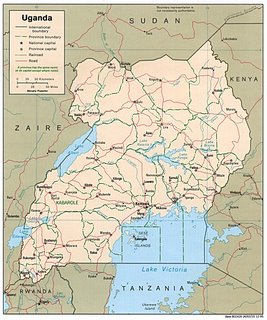The Dark Continent
The first thing noticeable when flying over Toronto by night is a vast patchwork quilt of lights, twinkling in grids and swirls, condensing into the heart of downtown, and fading into distant farmland. Flying over Dubai in the daytime, I had been greeted by a city rising out of endless sand dunes to confront a tranquil sea. From the moment the captain had announced our descent over Entebbe, I had been eagerly peering out the window, awaiting my first sight of the sparklings lights that would outline my new home.
The first thing noticeable when landing in Entebbe at night is that nothing is noticeable at all. There was neither the vast Ugandan landscape, nor the sparseness of the airport. In fact, until the moment the plane touched down on the runway, I remained in that same position, peering out the window, wondering when the cloud cover would part. It took me a moment to register that the bumps I’d felt were the plane landing and that the few small rectangular lights I saw approaching us were the main airport building.
My classmate, Amna, and I were met at the airport by Fred, our driver for the thirty-two kilometer journey into the capital, Kampala. It was around the tenth kilometer that I became aware of the street lights. They were along the meridian in the middle of the road, looking much as they do anywhere on Earth, with one important exception. Not a single one of them was on.
Kampala is a city of contrasts. Populated by apartments and villas along its main streets and hilltops, the bulk of its citizens live in metal-roofed shacks. It contains the potential for nearly every modern convenience. There are restaurants serving everything French to Indian cuisine, a bowling alley, movie theatres playing the latest Hollywood blockbusters, and street vendors selling roasted maize. There are large illuminated billboards and traffic lights that drivers mostly ignore. One can only partially blame the drivers though as half the time, the lights are not on.
Power generation here is unable to meet the city’s demand. The result is a series of scheduled rolling blackouts throughout the area that from what I understand are becoming more, rather than less, frequent. Imagine the effect on a small business office, government department, or even budding young restaurant when refrigerators, computers, and lights are only operational every other day.
Amna and I will be here over the coming weeks, learning everything we can about how medicine is practiced in Uganda. Having arrived here only ten days ago, it’s still a novelty for me to live by candlelight every second night. For the hospital workers, government employees, and budding Ugandan entrepreneurs, I can only imagine the frustration.
Last week we began shadowing Mulago hospital’s orthopaedic residents as they made rounds through the casualty wards. There are diseases and injuries here that one would never see back home. Most of them we would consider unnecessary and preventable. The doctors here, with knowledge, textbooks, and communications from Europe, North America, Australia, and Asia are aware of it. They’re also disturbingly matter of fact about it. “Come here. Have a look at this. In your country this infection would have been caught in the early stages. Here it has progressed for six months before the boy’s family decided to send him for treatment.”
The children are perhaps the most surprising, both tough and resilient. We saw a boy last week. The middle third of the bone in his lower-right leg was completely exposed from an open fracture linked to infection. He barely flinched as the doctors removed his bandage to probe the wound. He moaned slightly once or twice. After several minutes, I think I saw a single tear from the pain. There was another young boy the following day in the admissions ward. He couldn’t have been more than five years old. He smiled ear to ear when he saw the strange white people arrive. His right leg had been amputated the previous day.
The people here are some of the friendliest I have seen anywhere. There is a warmth to them that is sometimes guarded but very genuine. I’m wondering how much of it comes from their faith. Every small minivan bus sports a sign with slogans from “God makes wealth,” to “Jesus saves.”
For now, just a short note to let you all know that I’ve arrived safely and to apologise for the long delay in restarting my posts. Though there’s much to tell, I once again find myself in the process of trying to think my way around a new country, context, and culture. Pictures, anecdotes, and thoughts will hopefully start to flow again once I’ve begun to work out how best to convey the experiences here. For those who would like to be in contact, please don’t hesitate to send an e-mail or post a comment to the blog. We’ve purchased a cell phone and can also be reached at 011-256-71-206-1040. The time difference is seven hours.
I hope this finds you all well. Misnamed though it now is, welcome back to the blog.


4 Comments:
Not only are we all eagerly waiting to read about your experiences, but we will also patiently await the many thoughts which will haunt you after your return.
Stay Healthy!
Adam,
I am glad to know you have arrived safely and look forward to reading about your adventures.
Best,
Tanya.
now that my son is back from Ghan, i have been blogless for a few weeks. nice to have yours to read enjoy guys
doctor mark
Hey you three,
Good to hear from you. Thanks very much for the well-wishes.
All the best,
Adam
Post a Comment
<< Home